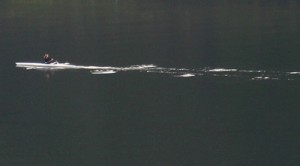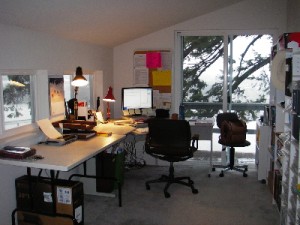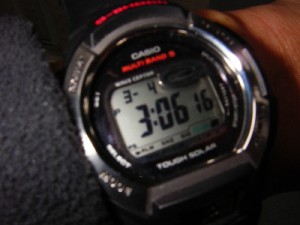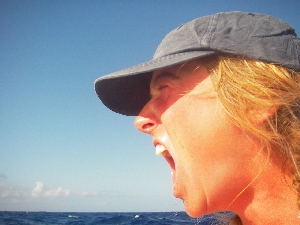
Well, maybe not a cruise exactly, as cruising doesn't normally involve blood, sweat and blisters.
My training is coming along well. As well as weights, circuits, running, yoga, racquetball and rowing on a rowing machine, I've been out in my Maas Aero sculling boat on the Columbia. My longest outing so far has been from the Hood River marina to Mosier and back - a distance of about 14 miles. Not a bad training session (about 2 hours) but still a long way short of the 8 hours a day I'm aiming to do on the Pacific.
Much as I like my WaterRower rowing simulator, it makes SUCH a nice change to get out on the water when conditions allow. The time passes a lot more quickly when the scenery is changing. And being chased down the river by a barge the size of a small town gives me a powerful incentive to keep paddling hard.
I'm keeping my boat in a friend's boathouse in the marina. It's very convenient as it saves me loading the Aero onto the top of Quackers (my yellow truck) every time I go rowing, but launching and disembarking in the narrow confines of the boathouse is a delicate balancing act. The boat is unstable until the oars are in the oarlocks and extended perpendicular to the boat, and there isn't room to do that inside the boathouse, so I have to partially extend them and then try to hold the boat level as I step in and push out. My training rows haven't turned into training swims just yet, but I'm sure it's only a matter of time...
[Photo by Eric Sanford, taken from the deck of our house]
|
|

I've been in one place for nearly two whole weeks now - woohoo! This is the first time that I've been in any one place for a LONG time. It's given me a chance to set up a study at Eric's house, with a proper desk and monitor and files and all the things I need in order to work efficiently. I'm proud of my ability to work while on the road, but it makes a nice change to have some stability and get my technological infrastructure sorted out.
Notice that I prefer to call it a 'study' rather than an 'office' - after 11 not-so-enjoyable years working as a management consultant I am still celebrating my freedom, and the O-word still brings me out in a palpitations....
|
|

This is my lovely new G-Shock watch from the people at Casio. During the Atlantic row my old G-Shock was one of my most cherished pieces of equipment. Solar-powered, it never needed a new battery, and with up to 4 alarm settings, I could use it to tell me when another ten minutes of my shift had passed once it got too dark to see my watch without stopping rowing to press the illumination button. It also updates the time automatically from a time calibration signal sent from Germany, to ensure 100% accuracy.
I don't need an atomic watch, though, to tell me that time is ticking away. I've got just 4 months before I am due to launch from San Francisco, and lots still to do.
Unless there are any major disasters, I will be ready in time - it's just a question of how many bells and whistles I can add. But if every expedition waited until the preparations were 100% ready, no project would ever get off the ground. There is always more that can be done. Provided I've got an ocean-ready boat and all the safety aspects have been taken care of, I'm happy to set myself a deadline and stick to it.
|
|

Good news! The 'Watchkeeper' project that I first conceived for the Atlantic, but didn't have time to implement, seems to be coming together this time around. You may have seen the inklings of this at the start of the Atlantic row - how many hours rowed, hours slept, thought for the day - but there wasn't enough momentum behind it to keep it going and it went the way of anything that wasn't vital to my survival.
[Photo: Atlantic scream therapy, 2006]
This time around, critical mass has already been achieved, and much more is in the pipeline. More news to come in due course, but for now I'd like to tell you about my tie-in with the study that the University of Portsmouth is conducting into the psychology of solo adventurers. They are already working with the sailors in the Velux 5 Oceans solo yacht race and will now be including me in a related research project.
In May I will have a pre-row interview with Dr Neil Weston, and during the row itself I will fill out a daily questionnaire to evaluate my mental state. The hope is that this will shed some light on how people react in stressful situations - will my psychological state be a fair reflection of my circumstances, or will I start over-reacting when under duress? This may well be of interest to all kinds of people - not only endurance athletes, but also anyone who has to perform under pressure - at work at home, in relationships.
I'm keenly aware that on the Atlantic, I made life very difficult for myself psychologically, so avoiding this same pitfall will be a key part of my preparations for the Pacific. In this vein, I've just taken up yoga again, with a class this morning at Flow in Hood River, and I've also started reading Raj Persaud's book, The Motivated Mind. Now here is something he mentions that you may not know about Oscar winners - it seems the perks of the job are not limited to fancy designer frocks (and yes, two days later, American TV is STILL talking about them...):
'Winning an award leads to an increase in average life expectancy of almost four years compared to those who are merely nominated, and almost six years to those who appear in the same films but don't even get nominated... multiple winners lived almost three years longer on average than those who had just the one lonely Oscar on the mantelpiece."
Why should this be?
"The crucial factor seems to be that those in higher status positions have more control over their work... and it now appears that a sense of control over your life has huge stress and health implications."
Interesting. When you are on the ocean, there is so much that you cannot control - the weather, the sea state, the currents. The key surely (oh, do please let me remember this when I am out there!) is to retain control over the bit that I CAN control - my response to those conditions. If I choose to accept them rather than fight them, I will make life an awful lot easier for myself.
|
|